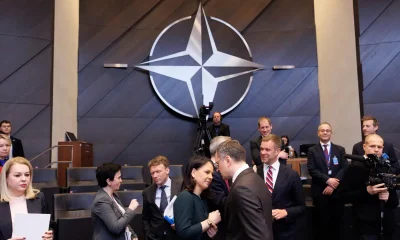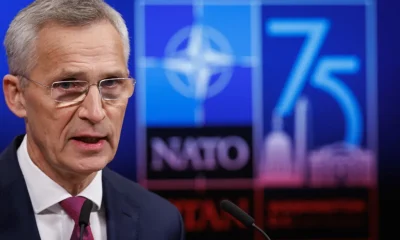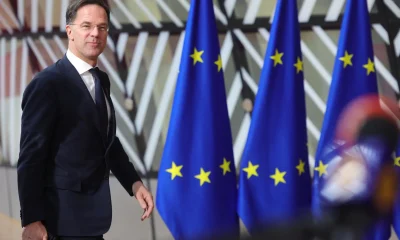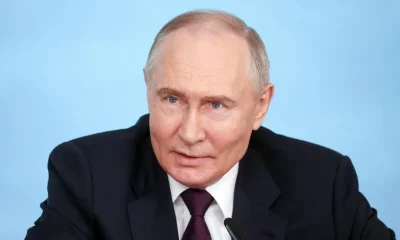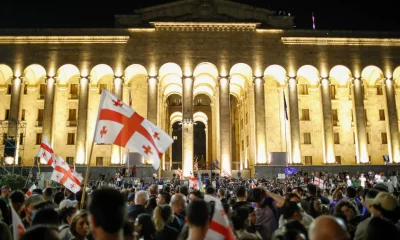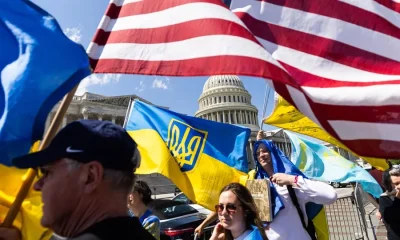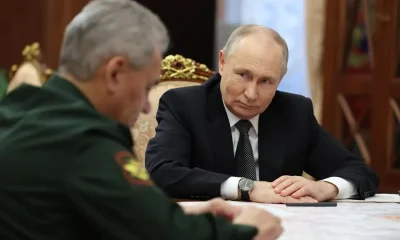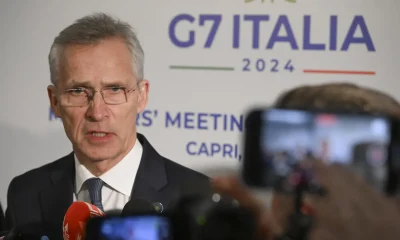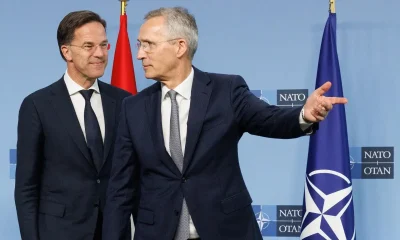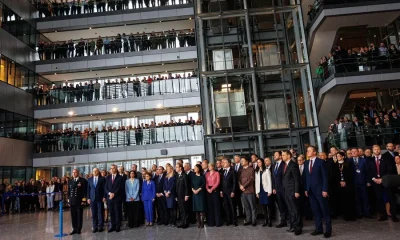International
Stoltenberg assures that NATO countries are willing to give more Patriots to Ukraine
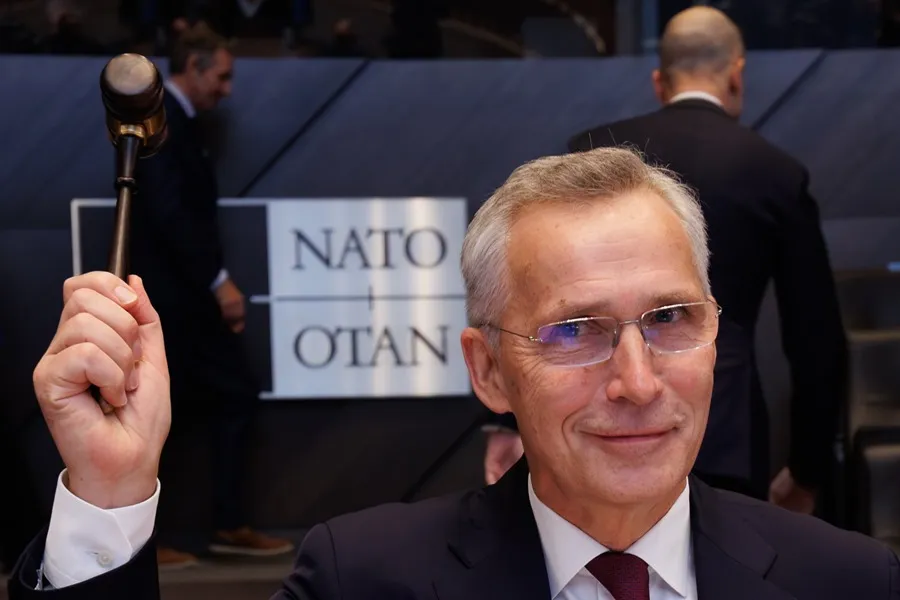
NATO Secretary General Jens Stoltenberg said on Thursday that the allies are willing to strengthen Ukraine’s air defenses, especially Patriot anti-missile batteries, after the specific request made today by the Ukrainian Foreign Minister, Dmitro Kuleba.
“The allies understand the urgency of accelerating when it comes to air defense, so they will now look in their inventories or if there is a way they can provide more systems, in particular Patriots,” Stoltenberg said at a press conference at the end of a two-day meeting of the Alliance’s Foreign Affairs heads.
At the same time, he said that it is necessary to make sure that the air defense systems that are already deployed in Ukraine “have the ammunition and spare parts to work as they should.”
“In part it is a question of battery systems, but it depends a lot on the delivery of the interceptors of the systems that are already there,” he explained.
Stoltenberg assured that several allies promised that they will make “a new effort to find what they can, see what else they can provide.”
The 32 allied ministers participated today in a meeting of the NATO-Ukraine Council after attending a ceremony to celebrate the 75th anniversary of the Atlantic Alliance.
“I don’t want to water the anniversary party, but my main message today will be Patriots, because saving Ukrainian lives, saving the Ukrainian economy, saving Ukrainian cities, depends on the capacity of the Patriots and other air defense systems,” Kuleba told the press upon his arrival at the meeting.
“The situation on the battlefield is still serious. Ukraine needs more air defenses, more ammunition and more help,” Stoltenberg stressed.
The Allied Secretary General listed that, in recent days, Germany has announced about 600 million euros for the Czech initiative to acquire artillery ammunition, the United Kingdom has announced the shipment of 10,000 drones to Kiev, France will give more missiles and armored vehicles and Finland will provide a new aid package worth 188 million euros.
“But we have to do even more. And we need to establish our support on an even firmer and more lasting basis,” he said.
Therefore, yesterday, Wednesday, the allied ministers agreed to move forward in the planning of a greater role of NATO in the coordination of aid and security training for Ukraine, a work that will continue in the coming weeks.
Stoltenberg indicated that the allies must move forward on these two aspects: the mobilization of urgent aid in the coming days and weeks and the establishment of “a more predictable framework for long-term support” that “does not depend on voluntary ‘ad hoc’ announcements, but on more predictable commitments.”
In this way, the allies have entrusted the supreme commander of the Alliance for Europe (SACEUR), American General Christopher G. Cavoli, start the planning of that framework, which “could be underpinned by financial commitments.”
Stoltenberg has proposed to create a fund of 100 billion euros for five years for Ukraine so that the support has a long-term journey, at a time when it is possible to return in November to the White House of Republican Donald Trump, who has already said that he would cut off attendance to Kiev.
“Russia is mobilizing more troops, but it is also willing to sacrifice men and material for marginal profits. This is serious, and that is exactly why it is urgent to mobilize more support for Ukraine,” argued the Norwegian politician.
He warned that there are fundamentally two possible scenarios: that the allies are able to mobilize more support and that Ukraine can recover more territory, or “that we are not able to do so.”
“And then there is a real risk that Russia will capture even more territory and that we will find ourselves in an even more dangerous position,” he said.
In his opinion, if NATO allies comply, he was convinced that Ukraine will be able to make new advances, and therefore “we must thoroughly seek and provide more military support” and put in place “stronger and more solid structures in the long term.”
Stoltenberg also insisted again that they have “no plan to have combat troops within Ukraine, there has been no request for it.”
The fact that the allies are providing him with weapons to defend himself “does not make us part of the conflict,” he said.
International
Thousands rally nationwide against Trump’s threat to U.S. democracy

Thousands of protesters gathered on Saturday (April 19, 2025) in major cities like New York and Washington, as well as in small communities across the United States, in a second wave of demonstrations against President Donald Trump. The crowds denounced what they view as growing threats to the country’s democratic ideals.
In New York City, demonstrators of all ages rallied in front of the Public Library near Trump Tower, holding signs accusing the president of undermining democratic institutions and judicial independence.
Many protesters also criticized Trump’s hardline immigration policies, including mass deportations and raids targeting undocumented migrants.
“Democracy is in grave danger,” said Kathy Valyi, 73, the daughter of Holocaust survivors. She told AFP that the stories her parents shared about Adolf Hitler’s rise to power in 1930s Germany “are happening here now.”
In Washington, demonstrators voiced concern over what they see as Trump’s disregard for long-standing constitutional norms, such as the right to due process.
International
ACLU seeks emergency court order to stop venezuelan deportations under Wartime Law

The American Civil Liberties Union (ACLU) on Friday asked two federal judges to block the U.S. government under President Donald Trump from deporting any Venezuelan nationals detained in North Texas under a rarely used 18th-century wartime law, arguing that immigration officials appear to be moving forward with deportations despite Supreme Court-imposed limitations.
The ACLU has already filed lawsuits to stop the deportation of two Venezuelan men held at the Bluebonnet Detention Center, challenging the application of the Alien Enemies Act of 1798. The organization is now seeking a broader court order that would prevent the deportation of any immigrant in the region under that law.
In an emergency filing early Friday, the ACLU warned that immigration authorities were accusing other Venezuelan detainees of being members of the Tren de Aragua, a transnational criminal gang. These accusations, the ACLU argues, are being used to justify deportations under the wartime statute.
The Alien Enemies Act has only been invoked three times in U.S. history — most notably during World War II to detain Japanese-American civilians in internment camps. The Trump administration has claimed the law allows them to swiftly remove individuals identified as gang members, regardless of their immigration status.
The ACLU, together with Democracy Forward, filed legal actions aiming to suspend all deportations carried out under the law. Although the U.S. Supreme Court recently allowed deportations to resume, it unanimously ruled that they could only proceed if detainees are given a chance to present their cases in court and are granted “a reasonable amount of time” to challenge their pending removal.
International
Dominican ‘False Hero’ Arrested for Faking Role in Nightclub Collapse That Killed 231

A man identified as Rafael Rosario Mota falsely claimed to have rescued 12 people from the collapse of the Jet Set nightclub in Santo Domingo—a tragedy that left 231 people dead—but he was never at the scene.
Intelligence agents in the Dominican Republic arrested the 32-year-old man for pretending to be a hero who saved lives during the catastrophic incident, authorities announced.
Rosario Mota had been charging for media interviews in which he falsely claimed to have pulled survivors from the rubble after the nightclub’s roof collapsed in the early hours of April 8, during a concert by merengue singer Rubby Pérez, who was among those killed.
“He was never at the scene of the tragedy,” the police stated. The arrest took place just after he finished another interview on a digital platform, where he repeated his fabricated story in exchange for money as part of a “media tour” filled with manipulated information and invented testimonies.
“False hero!” read a message shared on the police force’s Instagram account alongside a short video of the suspect, in which he apologized: “I did it because I was paid. I ask forgiveness from the public and the authorities.”
-

 Central America5 days ago
Central America5 days agoPetro questions Ecuador’s vote, cites reports of military control and arrests
-

 International4 days ago
International4 days agoArsenal stun Real Madrid at the Bernabéu to reach Champions League semifinals
-

 International3 days ago
International3 days agoDominican ‘False Hero’ Arrested for Faking Role in Nightclub Collapse That Killed 231
-

 Central America3 days ago
Central America3 days agoNicaraguan Exiles to Mark 7th Anniversary of 2018 Protests with Global Commemorations
-

 International4 days ago
International4 days agoBogotá residents line up for yellow fever vaccine amid national alert
-

 International2 days ago
International2 days agoACLU seeks emergency court order to stop venezuelan deportations under Wartime Law
-

 International4 days ago
International4 days agoDeSantis’ immigration crackdown sparks alarm in Venezuelan Communities in Doral
-

 Central America2 days ago
Central America2 days agoUN complaint filed against Costa Rica over detention of migrant children
-

 International4 days ago
International4 days agoMexico refuses to restore ties with Ecuador while Noboa remains in office
-

 International15 hours ago
International15 hours agoThousands rally nationwide against Trump’s threat to U.S. democracy
-

 International5 days ago
International5 days agoColombia: Search continues for missing limb of italian scientist found dismembered














